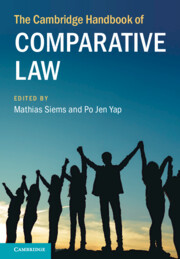Book contents
- The Cambridge Handbook of Comparative Law
- The Cambridge Handbook of Comparative Law
- Copyright page
- Contents
- Figures
- Tables
- Contributors
- Preface
- Abbreviations
- 1 Introduction
- Part I Methods of Comparative Law
- 2 Traditional Methods
- 3 Historical-Jurisprudential Methods
- 4 Critical Methods
- 5 Culture and Comparative Law Methodology
- 6 Linguistic Approaches
- 7 Qualitative Fieldwork
- 8 New Institutional Economics
- 9 Empirical Methods
- 10 Machine-Learning Methods
- Part II Legal Families and Geographical Comparisons
- Part III Central Themes in Comparative Law
- Part IV Comparative Law beyond the State
- Index
3 - Historical-Jurisprudential Methods
from Part I - Methods of Comparative Law
Published online by Cambridge University Press: 26 January 2024
- The Cambridge Handbook of Comparative Law
- The Cambridge Handbook of Comparative Law
- Copyright page
- Contents
- Figures
- Tables
- Contributors
- Preface
- Abbreviations
- 1 Introduction
- Part I Methods of Comparative Law
- 2 Traditional Methods
- 3 Historical-Jurisprudential Methods
- 4 Critical Methods
- 5 Culture and Comparative Law Methodology
- 6 Linguistic Approaches
- 7 Qualitative Fieldwork
- 8 New Institutional Economics
- 9 Empirical Methods
- 10 Machine-Learning Methods
- Part II Legal Families and Geographical Comparisons
- Part III Central Themes in Comparative Law
- Part IV Comparative Law beyond the State
- Index
Summary
The relationship between comparative law and legal history has been a topic of interest for a long time. But reflections on how methods could combine the historical approaches of legal systems around the world with theoretical or jurisprudential points of view really began with Edouard Lambert’s 1903 book La fonction du droit civil comparé. Using the two meanings of ‘jurisprudence’ (as case law in French language and as legal theory in English), Lambert proposed comparing positive rules while bearing in mind the weight of history and its limits. Following this path, this chapter explores critical and constructive approaches to comparative law through legal history. In the first part of this chapter, history is used to criticise simplistic conceptions of comparative law like ‘legal families’ and ‘national spirit’. In the second part, historical-jurisprudential approaches are defended as a means of more clearly delimiting legal phenomena and facilitating a deeper analysis of the dynamics of law. In conclusion, scholars are and should remain open to developing a diversity of historical-jurisprudential approaches.
- Type
- Chapter
- Information
- The Cambridge Handbook of Comparative Law , pp. 32 - 47Publisher: Cambridge University PressPrint publication year: 2024

